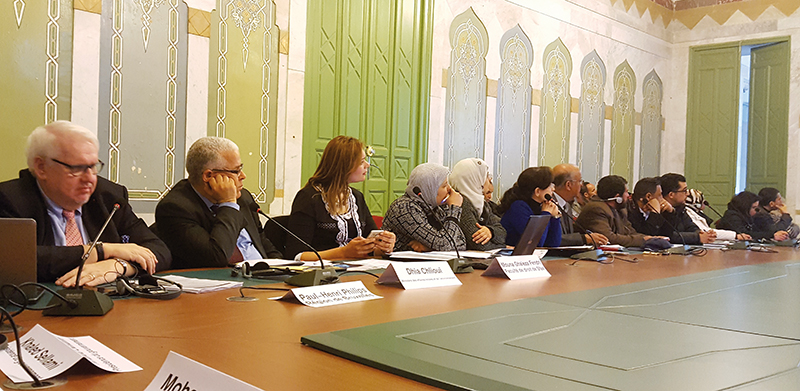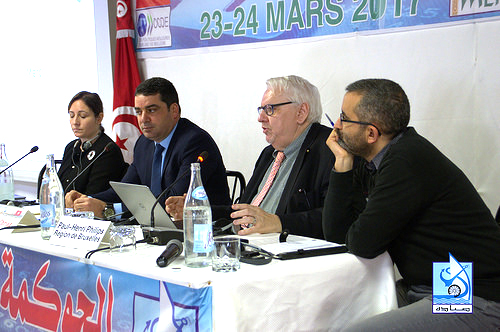Open governance perpetuates the breath of fresh air of the Tunisian “Arab Spring”
From 20 until 24 March 2017, a Brussels expert participated in a mission to Tunisia of the Organisation for Economic Co-operation and Development (OECD) on the theme of open governance and the democratic evolution of the Tunisian institutions on the local level.

Seminar in Sfax, in the presence of the representative of the Minister of Local Governance.

Seminar in Sayada, attended by Mabrouk Kossemtini, the President of the Special Delegation (left) and Paqui Santoja, OECD Coordinator.
The OECD’s mission was held in the framework of the OECD’s open governance project in Tunisia. This initiative, which the Tunisian government is actively supporting, aims to elaborate and implement policies and measures for transparency and participation on the local and national level. The mission based itself on the OECD methodology that includes information seminars and the exchange of experiences with representatives of the countries in question. The OECD also publishes Public Governance Review Reports, which review the legal, political and institutional framework as well as the implementation of initiatives. A previous collaboration between the OCED and the Tunisian Government aimed at supporting its policies culminated in the publication in 2016 of a report titled “Open Government in Tunisia”.
Tunisia, which enshrined the principle of open government at the local level in its new Constitution of 2014, focused on implementing this on the municipal level. The OECD is providing support for this process in three pilot cities, including Sayada and Sfax where two seminars were held during the March mission. The participation initiatives in these two cities and the draft Code on local collectivities, in which the principles of open government are enshrined, were discussed there.
The new Tunisian Constitution, which is the result of the Arab Spring of 2011, recognises the rights and freedoms of citizens. A chapter on local government defines decentralisation as the main premise for the organisation and distribution of power and a more efficient and citizen-friendly administration. The local and regional governments – which must be elected by universal suffrage – have specific powers and a legal personality, as well as financial and administrative autonomy under this Constitution.
In addition to the Constitution, a new Local Government is currently being finalised. It should come into force before the end of the year. The first municipal elections since the events of 2011 will be organised on 17 December. The election aims to replace the “special delegations”, made up of high-ranking officials and notables who are in charge of local governance on a provisional basis, with locally elected officials.
These deadlines are on the horizon while the legacy of the previous regime, more specifically the centralised government, currently prevents a consistent management of these local entities. The local governments still depend on external funding, which results in cumbersome and slow processes and structural difficulties. The special delegations, however, have already applied the cornerstones of open government in various initiatives, such as participatory budgets, annual investment plans that have been discussed by the population, consultation and dialogue… A climate of mutual trust, albeit still a very fragile one, has since been established with the representatives of civil society.
The implementation of open government, however, still leaves a lot to desire, which can probably be attributed to a lack of knowledge about the structures to be put in place rather than to a lack of transparency. If the current authorities prove that they are willing to move forward, on the other hand, we can only hope that the municipal councils that will be elected in December will take up the torch of open government.
Likewise, the relations between citizens and the local administration are fraught with difficulties and incomprehension, which, in the long term, may pose a real risk in the long term, causing the population to lose trust in participation and co-decision mechanisms. These difficulties can be partly attributed to the fact that civil society is not sufficiently prepared, in spite of its willingness to participate. The economic and trade union stakeholders, who are equally willing, have already asserted that they are ready to invest, but only after the municipal elections.
So what is the conclusion of this joint mission? On the one hand, the programmes of international organisations undeniably intersect in a tight network. They offer countries that are undergoing institutional change the impetus and assistance they need for any democratisation process. On the other hand, the socio-economic revival in Tunisia, in particular in the post-terrorism context, must go hand in hand with a renewal of public administration (efficiency, transparency and ethics among others) and a process of responsible citizens’ participation, within a specific framework.
Finally, Brussels expertise was also an asset for this kind of mission. The Brussels-Capital Region is very familiar with these democratic processes of decentralised governance by local governments. Moreover, it is equally undeniable that our constitutional evolution can provide valuable insights for their institutional change.



